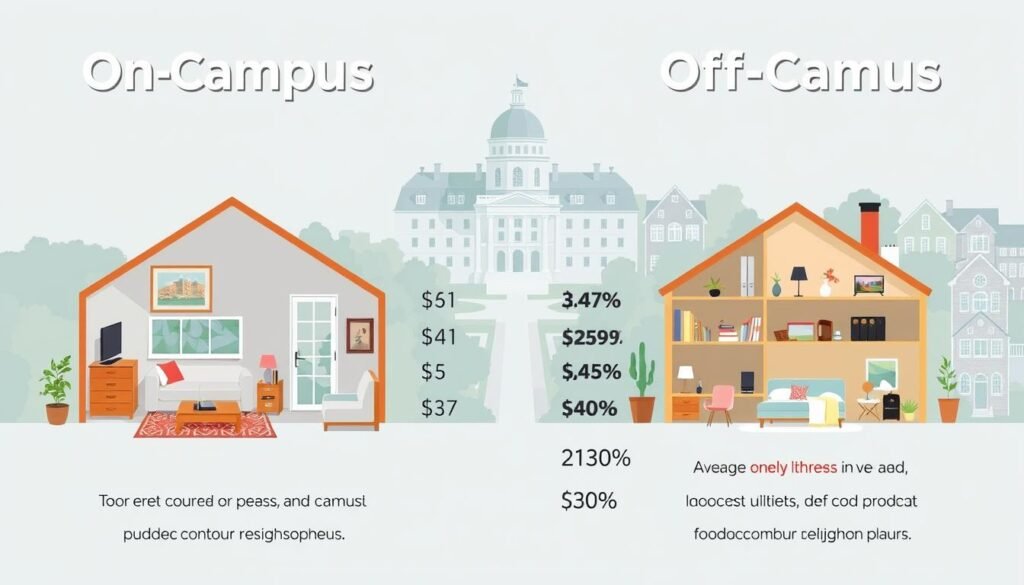When looking at Keiser University tuition, remember to include housing costs. These costs can greatly affect how much you’ll pay to attend. It’s important to know what goes into housing costs, like room and board, meal plans, and extra fees.
Keiser University’s tuition and housing costs can change based on several things. Students need to understand these factors to know the total cost of going to school. Knowing how housing costs are broken down helps students plan their expenses better.

University housing costs, including Keiser University’s, are a big investment. But with the right info and planning, students can handle these costs and enjoy their university time.
Key Takeaways
- Understanding university housing costs is essential for students and their families.
- Keiser University tuition and university housing costs can vary depending on several factors.
- Room and board, meal plans, and additional expenses contribute to university housing costs.
- Students need to be aware of the factors that affect university housing costs to make informed decisions.
- Planning and preparing for university housing costs can help students make the most of their educational experience.
- Keiser University tuition and university housing costs require careful consideration and planning.
Understanding Keiser University Housing Options
Choosing the right student housing options is important. Keiser University has many choices to fit different needs. You can live on campus in traditional halls or modern apartments.
Keiser University has many on-campus living options. Each has its own benefits. You can choose from halls with a social vibe or apartments for more independence. There are also living learning communities for students with similar interests.
When picking student housing options, think about location, safety, and amenities. Look at things like dining halls, fitness centers, and study spaces. This helps find the best housing for your lifestyle and studies.
Exploring on-campus living options can help you decide. Keiser University offers a variety of housing. Whether you prefer the social halls or the private apartments, there’s something for everyone.
Current Keiser University Housing Cost Breakdown
It’s important for students and parents to know the costs of room and board. Keiser University offers a detailed breakdown of these costs. This helps students plan their college expenses better. The costs of room and board are part of the overall tuition and fees.
Several factors influence room and board costs at Keiser University. These include the type of accommodation, meal plans, and other expenses. Students have various housing options to choose from. Each option has its own costs and benefits.
To understand housing costs at Keiser University, students can check the university’s website or contact the housing department. The university keeps its housing and living expenses information up to date. This helps students plan for their time at Keiser University.
When looking at housing costs at Keiser University, consider these points:
- Room and board costs change based on accommodation and meal plan choices
- Other college living expenses, like utilities and maintenance, are included in housing costs
- Students can pick from different meal plans to meet their dietary needs
Room Types and Price Variations
Choosing a room at Keiser University means picking from several options. The room type affects the housing cost. It’s key to know the different rooms and their prices to make a good choice.
Keiser University has single, double, and suite rooms. Each has its own benefits and drawbacks. Students should think about cost, lifestyle, and personal taste when deciding.
Single Occupancy Rooms
Single rooms are great for those who want privacy and are willing to pay more. They usually have a single bed, desk, and closet, and sometimes a private bathroom. Prices for these rooms start at about $1,500 per semester.
Double Occupancy Rooms
Double rooms are cheaper and let students share with a roommate. They have two beds, desks, and closets, and sometimes a shared bathroom. Prices start at around $1,000 per semester.
Suite-Style Accommodations
Suites offer a more independent living experience. Students have their own bedroom and share common areas and a kitchen with others. These rooms are perfect for those wanting a traditional college life. Prices vary, but start at about $1,200 per semester.
The right room depends on what each student needs and wants. By considering cost, lifestyle, and personal preferences, students can find a room that fits their budget and meets their needs.
| Room Type | Cost per Semester |
|---|---|
| Single Occupancy Room | $1,500 |
| Double Occupancy Room | $1,000 |
| Suite-Style Accommodations | $1,200 |
Meal Plans and Dining Costs
Keiser University offers various meal plans to fit different budgets and needs. Each meal plan has its own benefits and costs. It’s important to understand these options to manage expenses well.
The meal plans at Keiser University are designed to be affordable and convenient. Prices vary based on the number of meals and the dining experience. Students can pick from traditional meal plans or more flexible options that let them buy individual meals or snacks.
When choosing a meal plan, consider the cost per meal, the number of meals, and flexibility. Think about your eating habits and preferences too. For example, if you like to cook, a plan with fewer meals might be better. If you often eat out, a more flexible plan could be better.

Students should also think about other dining costs like snacks, drinks, and eating out. Keiser University has many dining options, including cafes, restaurants, and food courts. These can be convenient but might cost more than cooking at home. By knowing the meal plans and dining costs, students can make smart choices about their dining expenses and budget.
Here are some tips for managing dining costs:
- Choose a meal plan that matches your eating habits and budget.
- Cook meals in your residence hall or apartment to save money.
- Use discounts and promotions from Keiser University’s dining services.
- Use cash or credit cards for dining out instead of meal plans.
Additional Housing-Related Expenses
When figuring out the cost of housing, remember all the extra costs. These can add up fast. Knowing about them early helps students budget better. Additional housing expenses include security deposits and utilities coverage, which might not be in the rent.
Some key costs to think about are:
- Security deposits: These are usually refundable but can be a big upfront cost.
- Utilities coverage: This includes electricity, water, and internet, and varies by housing choice.
- Maintenance fees: These are charged to cover upkeep costs.
It’s important to include these costs in your budget to avoid surprises. Knowing what to expect helps students choose the right housing and plan their finances.
Here’s a quick summary of these extra costs in a table:
| Expense Type | Description |
|---|---|
| Security Deposits | Refundable deposit required when signing a lease |
| Utilities Coverage | Cost of electricity, water, and internet |
| Maintenance Fees | Periodic fees for maintaining the housing facility |
Comparing On-Campus vs Off-Campus Living Expenses
Students often face a big choice: living on campus or off campus. The cost is a major factor. On-campus living includes room, utilities, and meal plans. Off-campus living means paying for rent, utilities, and food.
It’s important to think about the total cost of living in each place. Consider things like convenience, safety, and what’s included. For example, living on campus is close to classes and resources. Off-campus living offers more freedom and independence.
Looking at the costs can help students decide. Here’s a quick comparison:
| Expense | On-Campus | Off-Campus |
|---|---|---|
| Room and Board | $8,000 – $10,000 per year | $6,000 – $8,000 per year |
| Utilities | included in room and board | $1,000 – $2,000 per year |
| Meal Plan | $3,000 – $5,000 per year | not applicable |
| Total | $11,000 – $15,000 per year | $7,000 – $10,000 per year |

The choice between living on campus or off campus depends on what you want. By looking at the costs and other factors, you can choose what’s best for you and your budget.
Financial Aid Options for Housing
It’s important for students to know about financial aid for housing. Keiser University offers housing scholarships and student loans. These help students manage their costs and focus on studies.
Students can look into federal and state grants, private scholarships, and aid from the university. To get these, they need to show financial need, keep a good GPA, and fill out the FAFSA.
- Housing scholarships: These are merit-based or need-based awards that can help cover housing costs.
- Student loans: These are low-interest loans that can be used to cover room and board expenses.
- Payment plans: These are installment plans that allow students to pay their housing costs in monthly or quarterly payments.
Using these financial aid options can ease the financial load for students. It’s key to research and apply for these aids early to meet eligibility criteria.
Housing Application Process and Deadlines
Understanding the housing application process is key to getting your preferred housing at Keiser University. It starts with an online application. You’ll need to provide personal and academic details and pay a non-refundable fee.
It’s important to check the application deadlines. They can change based on the semester and housing type. Application deadlines are posted on the university’s website. Applying early helps secure your preferred housing.
To smoothly go through the housing application process, follow these steps:
- Check the university’s website for deadlines and requirements
- Fill out the online application and pay the fee
- Submit needed documents, like proof of enrollment and health insurance
- Wait for your application to be processed and get your housing assignment
By following these steps and meeting deadlines, you can have a smooth application process. This increases your chances of getting your preferred housing.
Tips for Reducing Housing Expenses
When planning your housing at Keiser University, there are smart ways to cut costs. Start by looking at your meal plan options. Choose one that matches your eating habits and budget. Universities often have flexible plans that save you money by only charging for what you eat.
Finding roommates can also help lower your expenses. By splitting rent, utilities, and other costs, you can save a lot. Make an effort to meet other students and find the perfect roommate to save money together.
Don’t miss out on early bird discounts or housing application deadlines. Universities often give perks to students who book early. Keep an eye out for these deals to lower your housing costs at Keiser.
FAQ
What factors affect the housing costs at Keiser University?
Housing costs at Keiser University depend on several things. These include room and board, meal plans, and extra costs like security deposits and utilities.
What types of housing options are available at Keiser University?
Keiser University has many housing choices. You can live in on-campus halls, student apartments, or special living learning communities. Each option has its own benefits.
How do the current housing costs at Keiser University compare to the overall tuition and fees?
Housing costs at Keiser University are a big part of the total tuition and fees. Students should think about these costs when planning their budget.
How do the prices vary for different room types at Keiser University?
Prices for housing at Keiser University change based on the room type. Single, double, and suite-style rooms have different prices.
What meal plan options are available at Keiser University, and how do they affect the overall housing costs?
Keiser University has many meal plan choices. The cost of these plans is a key factor in housing expenses for students.
What additional expenses should students consider when calculating their housing costs at Keiser University?
Besides room and board, students should also think about other costs. This includes security deposits, utilities, and maintenance fees.
How do the costs of living on campus versus off campus compare at Keiser University?
Students should compare living on campus versus off campus costs. Consider rent, utilities, and meal plans to make a good choice.
What financial aid options are available to help cover housing costs at Keiser University?
Keiser University has financial aid to help with housing costs. This includes scholarships, loans for room and board, and payment plans.
What is the housing application process and deadlines at Keiser University?
Students interested in housing at Keiser University need to know the application process and deadlines. This ensures they get the housing they want.
How can students reduce their housing expenses at Keiser University?
To cut housing costs at Keiser University, students can try a few things. Choose the right meal plan, find good roommates, and look for early bird discounts.
